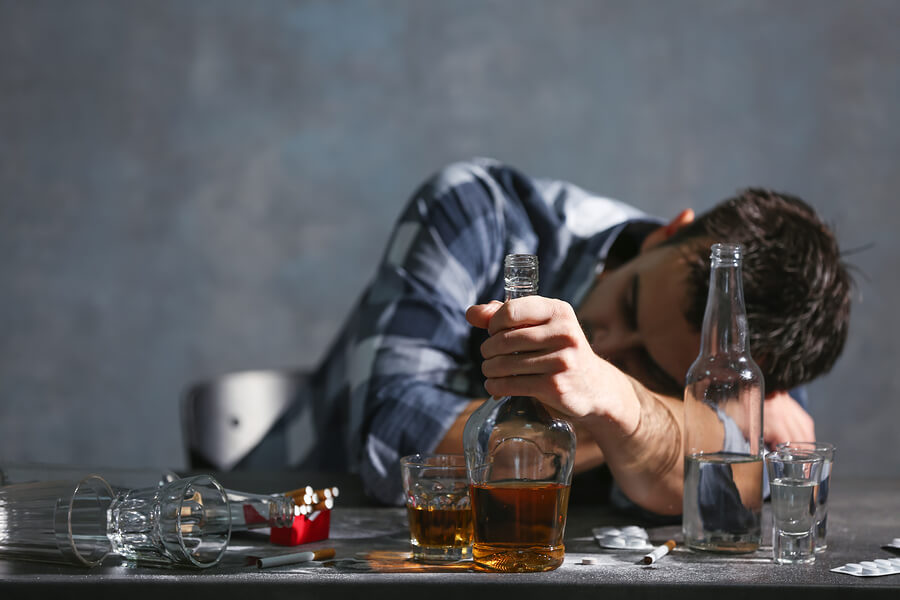
What Is Binge Drinking? – Binge drinking is a dangerous practice that involves the consumption of an excessive amount of alcohol in a relatively short amount of time. The Centers for Disease Control and Prevention (CDC) state that binge drinking causes a person’s BAC (blood alcohol concentration) to rise to 0.08% or higher, and is described as an occasion when a person has at least 4-5 drinks during a two-hour period.
In the United States, binge drinking is most common among persons age 26 and older—it is estimated that this group accounts for about 70% of all incidents of binge drinking. For some, particularly those using prescription medications or illicit drugs, it may take less alcohol consumption to achieve a BAC that would be considered to qualify as binge drinking.
The National Institute on Alcohol Abuse and Alcoholism (NIDA) defines one “drink” as the consumption of any of the following:
- 12 ounces of beer
- 5 ounces of wine
- 1.5 oz. of distilled spirits (liquor)
A single episode of binge drinking does not necessarily imply the person has an alcohol use disorder (AUD). Repeated incidents of binge drinking do, however, markedly increase the likelihood that the person who is engaging in this practice will develop an AUD. The transformation from occasional binge drinking to full-blown alcohol addiction can happen rapidly, and significant health effects and other serious consequences are likely to follow.
The majority of people (an estimated 80%) who admit to binge drinking on surveys are not chemically dependent on alcohol. Nevertheless, instances of binge drinking account for the highest percentage of fatalities related to alcohol use. Because alcoholism is such an insidious disease, binge drinking, if left untreated and unmanaged, threatens to take over a person’s life, and could eventually lead to severe complications and death.
Reasons for Binge Drinking
In the U.S., binge drinking has become more and more common despite accumulating research that reveals just how serious it can be. Unfortunately, alcohol use is not only socially acceptable but sometimes applauded in many cultures, including America. The dangers of alcohol are generally overshadowed by problems with other illicit substances such as opioids, cocaine, and meth.
Common reasons for binge drinking behavior include the following:
Problem Avoidance
Probably the most popular reason that people say they participate in binge drinking is to relax and forget about problems for a little while—this fact may be more or less related to the “self-medication” effects that alcohol provides for some people. After a couple of drinks, the person starts to feel better as everything is alright, so they continue drinking to sustain that feeling.
Fun and to Lower Inhibitions
One of the main results of binge drinking is that people find it enjoyable. A large number of social occasions that people regularly attend—parties, weddings, holiday gatherings—involve alcohol use to some extent. Binge drinking at every single occasion can quickly lead to alcohol dependence, however.
Bars, clubs, and restaurants are also places where people can usually be found drinking. Many people say they enjoy the social aspect of it, and others who are normally shy or awkward say that it lowers inhibitions and reduces anxiety. The problem is that although drinking alcohol with friends can be highly sociable, the long-term effects of alcoholism are anything but, and can result in people being withdrawn and isolated, drinking in secret rather than to be social.
Tolerance Tests and Competitions
Drinking games are commonly found at parties and social events, especially those involving young people. During such games, binge drinking turns into a social sport or spectacle of sorts, as people seek to determine who has the highest tolerance. Unfortunately, this kind of binge drinking can actually be the most dangerous, as it puts people in imminent danger of life-threatening alcohol poisoning.
Side Effects of Binge Drinking

Binge drinking has been associated with a wide variety of health and behavioral problems. While many side effects are relatively mild and acute, others can result in permanent damage.
Acute side effects of binge drinking may include, but are not limited to the following:
Drinking too much alcohol within a short period of time puts one at risk for a range of health problems and trauma. For example, alcohol is notorious for reducing a driver’s reaction time, which can put him or her and other drivers and passengers in danger.
Also, excessive alcohol consumption impairs decision-making abilities and increases impulsiveness, putting one at risk for unintentional injuries, including those involving dangerous stunts, sexual assault, domestic violence, and acute alcohol poisoning.
Repeated episodes of binge drinking over a prolonged period can result in a multitude of long-term complications, and would likely be considered for a diagnosis of alcohol use disorder. These may include brain damage, liver disease, heart problems, and an increased risk of stroke and some cancers.
Treatment for Binge Drinking
It is worthwhile to restress the fact that although binge drinking is not equivalent to full-blown alcoholism, it can be just as dangerous. Consuming mass amounts of alcohol in a brief period can severely compromise a person’s physical and emotional well-being. What’s more, excessive alcohol use not only affects the drinker but is also likely to intrude on the lives of family and other loved ones and produce a ripple of adverse effects that is neverending.
Those who regularly participate in binge drinking behaviors are urged to seek treatment for alcohol abuse. Our Midwood Addiction Treatment center offers a comprehensive, evidence-based approach that features essential therapeutic services such as behavioral therapy, individual and family counseling, group support, and aftercare planning.
Please don’t let alcohol abuse lead you down a trail of self-destruction. Our skilled team of addiction specialists can provide you with the resources and tools you need to recover and begin to experience the long-lasting wellness and sobriety you deserve! Call us today to find out how we can help!